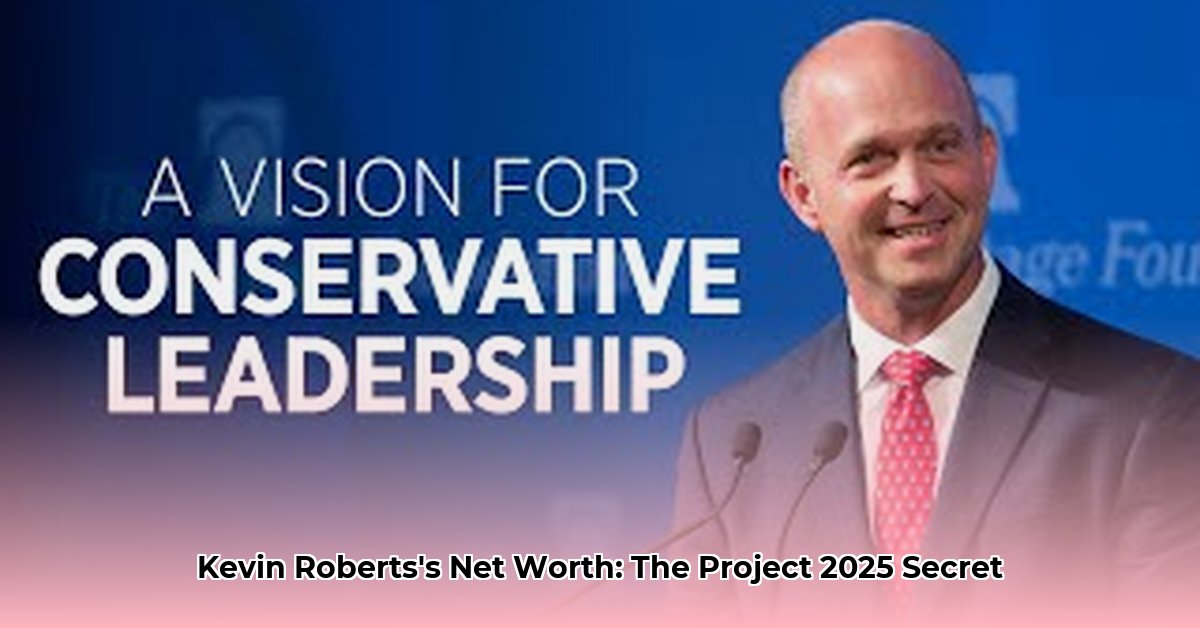
Kevin Roberts' substantial net worth, a reflection of his prominent position within the conservative movement, provides a glimpse into the power dynamics shaping American politics. Public records indicate his annual compensation at the Heritage Foundation exceeds $953,920, a significant figure illustrating his financial standing. However, his wealth is only one facet of a much larger narrative centered around his influence and the controversial Project 2025.
Project 2025: Ambitions, Controversies, and Consequences
Roberts serves as the driving force behind Project 2025, a comprehensive initiative aiming to fundamentally reshape the federal government. This ambitious plan outlines a conservative overhaul impacting various aspects of American governance, from environmental regulations to social programs. However, the project has sparked considerable debate. Critics raise concerns about its potential to undermine democratic processes and create an imbalance of power in Washington D.C. "The scale of the proposed changes is unprecedented and raises serious questions about its potential impact on democratic institutions," notes Dr. Anya Sharma, Professor of Political Science at Georgetown University. The project’s ambitious goals and potential unintended consequences are major points of contention.
The Heritage Foundation's Influence
Roberts' influence stems significantly from his position at the Heritage Foundation, a highly influential conservative think tank. The Foundation acts as a powerful voice in the conservative sphere, shaping political discussions and policy debates. Roberts' leadership amplifies his ability to promote his agenda and connect with key policymakers. This strategic position, however, also places him under intense scrutiny. "The Heritage Foundation's role in shaping policy discourse is undeniable, and Roberts' position within the organization significantly enhances his ability to influence the political landscape," explains Dr. Michael Davis, a political analyst at the Brookings Institution. This influence, however, also invites both praise and criticism.
A Legacy Under Construction
The long-term impact of Project 2025 remains uncertain. The project’s success hinges on several factors, including the political climate, public support, and the ability to overcome legal challenges. The long-term consequences, whether positive or negative, are subjects of ongoing debate, and their evaluation requires careful observation. Roberts' lasting legacy will be shaped not only by his financial success but also by the ultimate outcome of Project 2025 and its far-reaching consequences. Will it reshape American politics as intended? Or will it face significant obstacles and limitations?
Project 2025's Potential Impact on US Regulatory Agencies
Project 2025 proposes significant changes to US regulatory agencies. The plan advocates for significant regulatory rollbacks, potentially leading to a more business-friendly environment, but also raising concerns about reduced consumer protections and environmental safeguards.
Regulatory Overhaul: A Conservative Blueprint
Project 2025 is not merely a policy proposal; it's a detailed strategy to fundamentally alter the US government's regulatory framework. It outlines a path for a conservative administration to significantly reshape numerous federal agencies. This ambitious undertaking aims to reduce regulatory burdens on businesses, a core tenet of the project's ideology. But what are the potential trade-offs? This is a critical question for any analysis of Project 2025.
Potential Consequences: A Balancing Act?
The potential impacts of Project 2025 are multifaceted. Reduced regulations could stimulate business growth and economic activity. However, this could come at the cost of weakened consumer protections, environmental safeguards, and financial market oversight. The project's success will depend on a conservative administration's ability to effectively execute its proposals while navigating political and legal challenges. "This comprehensive plan presents a trade-off between economic efficiency and social responsibility," comments Professor David Miller, an expert in regulatory economics from Harvard University. The long-term success of this intricate plan is far from guaranteed and requires ongoing analysis.
Key Takeaways:
- Project 2025 proposes a comprehensive overhaul of US regulatory agencies, advocating for substantial regulatory rollbacks.
- The initiative aims to create a more business-friendly environment but might weaken consumer and environmental protections.
- The plan's overall success depends on many factors, including political will, public opinion, and legal challenges.
- The long-term consequences of Project 2025 remain uncertain and are subject to ongoing debate and analysis.